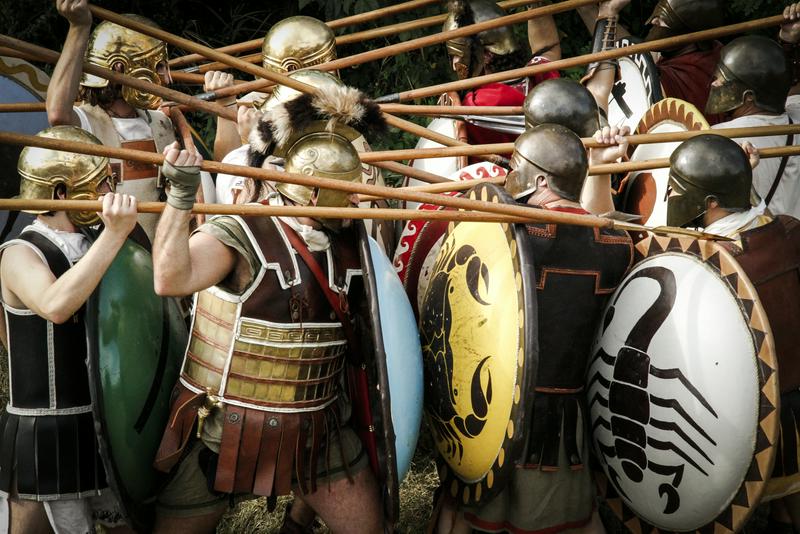The Way Of Ancient Sparta
By | October 8, 2019

When most people think of the historic Spartans, they think of Frank Miller’s 300 in which bare-chested Spartans hold off the advance of endless hordes of Persians. While the historicity of the Spartans of Miller’s imagination has many flaws, one thing is certain about the Spartans, they were outstanding warriors.
There are many examples today of “Spartan” training methods, or at least methods inspired by the Spartans of antiquity. The truth of the matter is that their entire society was geared to create skilled warriors. Spartan life was entirely different than anything in existence today and is a subject that entices the historical curiosity of armchair warriors to ironman triathletes.

Structure of Spartan Society
Sparta, sometimes Lacedaemon, was a city-state in southern Greece in the region of Laconia. The story of the Spartans as history knows them begins with Lycurgus, a semi-mythical figure who in the seventh century B.C. He instituted a new constitution for the city-state in order to bring order out of a period of unspecified chaos.
Lycurgus brought to Sparta a militant society divided into three classes. First were the Spartans who were full citizens with full rights. The second class was the Perioeci who were neither citizens nor slaves but worked as craftsmen and traders. The third class was the helots, a slave class of conquered peoples that outnumbered the Spartans seven to one. They farmed and did all the other manual labor that the Spartan citizens did not want to do.
Fear of a helot revolt was one of the main reasons why Sparta had a society that became so militant. It was geared for the violent oppression of the helots.
The basis of the new constitution was summed up best by the ancient Greek writer, Xenophon who noted, “Lycurgus made it clear that happiness was the reward of the brave, misery the reward of cowards.”
The Spartan system would endure for centuries and drew admiration from many other Greek city-states.

The Agoge
All Spartan males were born to be warriors. At birth, infants were inspected by Spartan elders. If the baby was considered unfit, he was abandoned to die from exposure to the elements unless rescued by strangers.
Only males were citizens of Sparta and trained as professional soldiers. In order to become a citizen one had to pass through a course of a state-run education system called the agoge. Boys were separated from their families and at age seven and entered into an agélai or “herd” which was headed by an older man. They were trained to give loyalty to the state and their communal mess halls over family and were incessantly trained to be warriors.
There were three age groups to the agoge system. The paides was the first group for boys between the ages of seven to puberty. After puberty, boys joined the paidiskoi up to the age of twenty and then from ages twenty to roughly thirty were in the hēbōntes.

Training Days
In the paides, boys would take part in intense athletic training and choral dance while being taught how to obey, be austere, and endure suffering. They participated in mock battles against older boys and they often went barefoot and slept on reed beds. After age 12, the city-state issued one red cloak to them per year which they would wear in all weather conditions as a sign of their toughness. Boys were kept on tight rations but at the same time encouraged to steal food in order to develop their skills. If they were caught, however, they were severely flogged. Hazing was common and encouraged, again to improve a boy’s toughness.
Upon puberty, boys entered the paidiskoi under the apprenticeship of an elder warrior with whom some developed a sexual relationship. This was seen as a means to further develop the military bonds of the state and to pass on knowledge. At this age, too did they become reserve soldiers for Sparta. Some of these young men would be tasked to purposefully hunt down and kill helots for breaking rules or some other minor infraction -- such as being too smart.
At twenty, young Spartan men entered the last stage of their education, the hēbōntes. The physical training was more or less complete. Curiously, the Spartan government thought it best if men married after this training at age 30 and women at 20. If a couple married earlier, they would live apart until the man no longer needed to live in the barracks.

Spartan Women
Spartan women enjoyed relatively great freedom when compared to other ancient Greek city-states. While they were not citizens they could own property, were educated and competed in athletic competitions. The reason for this freedom may be two-fold -- first, the helots essentially did all the “women’s work” in the household leaving Spartan women time for other ventures. Second, Spartan women did not marry until relatively late and males were effectively separated from them in the agoge. Thus they did not have as much intense male presence over them as might be in other Greek city-states.

Sparta’s Finest Hour
Sparta’s greatest moment of fame came at the Battle of Thermopylae in 480 BC in which the Spartan king Leonidas held a rearguard against a massive army of King Xerxes of Persia. There are a few famous Spartan quips during this battle, including when a soldier complains that there will be so many arrows of the Persians it would blot out the sun. Leonidas reportedly said, “Good news! Then we shall fight in the shade.”
Even though the 300 Spartans who defended Thermopylae perished, they won eternal fame among Greeks and the world. In fact, many philosophers and writers from the ancient world until the Renaissance admired the Spartan system.

Pinnacle and Decline
After the war with Persia, Sparta went to war with its chief rival Athens during the Peloponnesian War from 431 to 404 B.C. Sparta emerged as the victor and became the dominant power in Greece. But it was short-lived. In 371 B.C. they were defeated by the Thebans at the Battle of Leuctra. This battle killed a number of Spartans who as a percentage of the population of the city-state, were very small. The next year, the Thebans invaded and liberated a large number of the helots. Sparta never recovered.
Centuries later, by the time of the Roman Empire, Sparta had become a tourist attraction where watching boys being flogged and thus showing off their Spartan endurance was apparently a main attraction.

